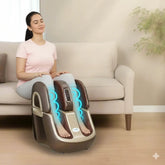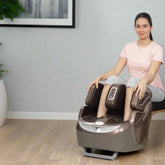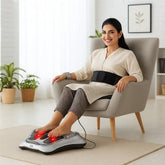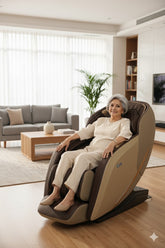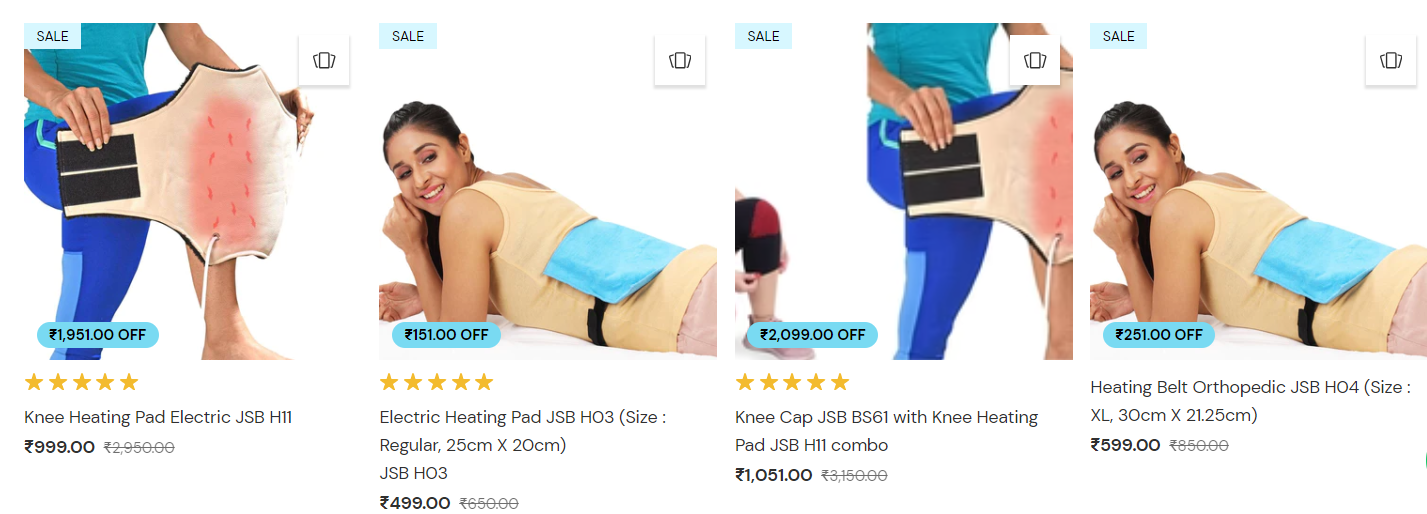As the chill of winter wraps itself around us, many turn to the comforting embrace of a heating pad. These cozy companions offer warmth and relief from the cold, soothing aches, and pains with gentle heat.
However, amidst the comfort, a question often arises, one that is not only practical but also essential for environmentally conscious consumers and budget-savvy individuals alike: Do heating pads use much electricity?
This blog delves into the heart of this question, exploring the energy consumption of heating pads and what it means for your monthly utility bills and ecological footprint.
We will unravel the mysteries of heating pad energy use, comparing it to other common household appliances and examining the factors that influence their electricity consumption.
Whether you're someone who relies on a heating pad for comfort during the colder months, seeks relief from muscle pain, or simply aims to understand the energy implications of your daily comforts, this exploration will shed light on the importance of being energy aware.
Join us as we navigate through the watts and whys, offering insights and tips to help you make informed decisions about your heating pad usage, all while keeping sustainability and cost-effectiveness in focus.
So, Do heating pads use much electricity?
Heating pads, often used for muscle relaxation and pain relief, are relatively low-energy devices compared to many other household appliances.
Here's a breakdown of their energy use without getting into calculations:
- Wattage: Most heating pads consume between 50 to 100 watts of power when in use. The exact amount depends on the heating pad's size, material, and the heat setting chosen. For comparison, a laptop might use about 45 to 100 watts, while a refrigerator can use 100 to 800 watts, depending on its size and efficiency.
- Energy Efficiency: Heating pads are designed to deliver heat directly to the body, which makes them quite energy-efficient for their purpose. They heat up quickly and can be used for targeted therapy without needing to heat an entire room or space, which would require much more energy.
- Usage Pattern: The energy consumption of a heating pad also depends on how often and how long it is used. Using a heating pad for an hour a day will consume much less electricity over a month than, say, an air conditioner or a space heater running for several hours each day.
- Thermostatic Control: Many modern heating pads come with thermostatic controls and auto shut-off features. These can help reduce electricity use by automatically maintaining a set temperature without the need for continuous power or by turning off the pad after a certain period to prevent unnecessary energy consumption.
- Cost to Operate: Given their relatively low wattage and efficient use of power, heating pads are inexpensive to operate. The cost of running a heating pad for a few hours a day is generally minimal compared to many other electrical devices in the home.
- Energy-Saving Tips: To minimize energy use further, users can take advantage of heating pads with adjustable settings to use the lowest effective temperature and ensure the pad is turned off or unplugged when not in use.
In summary, while heating pads do use electricity, their overall consumption is quite low, especially when used judiciously. They offer a cost-effective way to provide heat therapy without significantly impacting your electricity bill.
Are electric heating pads good for you?
Electric heating pads can offer several benefits, making them a good option for various situations, especially when used appropriately. Here are some of the key advantages and considerations regarding their use:
Benefits of Electric Heating Pads
- Pain Relief: Electric heating pads are effective in relieving pain in various parts of the body, including back pain, neck pain, menstrual cramps, and muscle aches. The heat helps increase blood flow to the area, which can reduce pain and accelerate healing.
- Muscle Relaxation: Applying heat can relax tense muscles, reducing stiffness and discomfort. This is particularly beneficial for people suffering from muscle spasms or conditions like arthritis.
- Flexibility Improvement: Heat therapy can increase flexibility by warming up the muscles, making it a good option before stretching exercises or physical activity to reduce the risk of injury.
- Convenience and Control: Electric heating pads allow for adjustable heat settings, enabling users to find the most comfortable and effective temperature for their needs. They're also convenient to use at home as part of a self-care routine.
- Cost-Effective Comfort: As discussed earlier, electric heating pads are energy-efficient, offering a cost-effective way to manage pain and discomfort without significant electricity consumption.
We’ve covered the key points here, but if you’d like to dive deeper, check out our detailed blog: “Are Electric Heating Pads Good for You?
Considerations and Precautions
While electric heating pads offer numerous benefits, there are also some important considerations and precautions to keep in mind:
- Avoid on Open Wounds: Applying heat to open wounds or swollen areas can increase swelling and delay healing.
- Not for Certain Conditions: People with certain conditions, such as deep vein thrombosis (DVT), diabetes (where sensation might be impaired), or specific types of dermatitis, should consult a healthcare provider before using heat therapy.
- Use as Directed: To avoid burns or other injuries, it's important to follow the manufacturer's instructions regarding use, including duration and heat settings.
- Monitor Skin Reaction: Some people may have sensitive skin or react differently to prolonged heat exposure. It's important to monitor for any adverse reactions or discomfort.
- Avoid Falling Asleep While Using: There's a risk of burns if you fall asleep with an electric heating pad on, especially on a high setting or if it doesn't have an automatic shut-off feature.
In summary, electric heating pads can be good for you, offering therapeutic benefits like pain relief and muscle relaxation. However, their use should be tailored to individual needs and health conditions, with proper precautions taken to avoid potential risks.
Is it OK to sleep with an electric heating pad on?
Sleeping with an electric heating pad on is generally not recommended due to safety risks, including the potential for burns and the risk of fire. Electric heating pads can get quite hot, and if left on for extended periods or if the safety features fail, there's a risk of burns, especially if one's skin or sensory perceptions are impaired (for instance, due to neuropathy or while asleep). Moreover, if the heating pad is old, damaged, or doesn't have an automatic shut-off feature, the risk of overheating and causing a fire increases.
Safer Alternatives for Overnight Use:
- Heating pads with auto shut-off: Some modern electric heating pads are designed with an auto shut-off feature that turns the pad off after a set amount of time (usually after about 1 to 2 hours). This feature can reduce the risk of burns and fire, but it's still better to avoid relying on it for overnight use.
- Microwaveable heat packs: These can be warmed in the microwave and will naturally cool down over time, reducing the risk of burns. However, they also should not be used while sleeping as they can still cause burns if too hot or if used improperly.
- Warm water bottles: A traditional hot water bottle can provide warmth for a significant amount of time without the risk of electrical hazards. Like with microwaveable packs, it's important to ensure it's not too hot to avoid burns.
- Bed warmers: Electric blanket or mattress pads with safety certifications and auto shut-off features can be an alternative. These are designed to be used for extended periods and typically come with adjustable heat settings and automatic shut-off functions for safer use during sleep.
Love the warmth but worried about Heating Pad Safety? 🔥
Get Free Expert Tips on Safe & Energy-Smart Use!
Best Practices for Using Electric Heating Pads:
- Never use a heating pad that shows signs of wear or damage.
- Always follow the manufacturer's instructions regarding use.
- Use heating pads for short durations for therapeutic purposes, rather than prolonged periods or overnight.
- Consider setting an alarm to remind you to turn off the heating pad if you're using it before sleeping.
If warmth is needed throughout the night for comfort or pain relief, safer alternatives should be considered to mitigate the risks associated with traditional electric heating pads. Always prioritize safety and consider consulting with a healthcare provider for personalized advice based on your health needs and conditions.
For more tips on safe usage and alternatives, you can read our detailed blog: “Is it OK to Sleep with an Electric Heating Pad On?
Conclusion on Do heating pads use much electricity:
In conclusion, heating pads are highly efficient in terms of electricity usage.
The energy efficiency of heating pads makes them a practical choice for regular use, especially during colder months or for therapeutic purposes, without the worry of significantly increasing your electricity bills. Therefore, for individuals considering the impact of their energy consumption, either for budgetary or environmental reasons, the use of an electric heating pad represents a minimal burden.
This efficiency, combined with the benefits of heat therapy, such as pain relief and muscle relaxation, highlights why electric heating pads are a favored choice for many. They offer a balance between comfort and energy consumption that few other comfort appliances can match.

